- Home
- Tamora Pierce
Daja's Book Page 2
Daja's Book Read online
Page 2
“She’s a xurdin, not a yerui,” Daja said quickly. She knew Polyam heard, but there was still custom to observe—she wouldn’t admit that she had. “Tris, tell her you’re a xurdin, a mage. She thinks you’re a yerui, a hungry ghost-devil. That your magic will eat her. Please,” she begged, knowing her friend was about to refuse.
The other girl sighed. The tiny bits of lightning began to shrink. “I’m a mage, all right?” she said to Polyam. “I’m a mage; she’s a mage. It’s just strange magic we have; it’s not like most people’s. It’s not evil; I won’t hurt you. I’m trying not to hurt you right now, and I’m succeeding, aren’t I?”
Polyam’s full mouth tightened. “You didn’t have to tell me your magic is strange,” she replied. “I’ve been on the roads all my life, and I’ve never seen anything like what you just did.”
Daja came up to stand at Tris’s back. “I’ll see if Sandry or Briar can get the smith,” she whispered into her friend’s ear. “Be polite. It’s not her fault I’m trangshi. Offer her water from the well.”
Tris glanced back and up into Daja’s eyes. “It’s not your fault, either.”
“It doesn’t matter, not if you’re a Trader. Offer her a drink.” Daja stepped into the shadows behind the forge. Perhaps if Tris couldn’t see Daja, she wouldn’t be so quick to defend her against what she saw as insults.
She’s only a kaq, thought Daja tiredly. It was the first time in weeks that she’d thought of the redhead that way. Tris wasn’t so bad, once you got to know her, but kaqs—those who weren’t Traders—didn’t understand important things like trangshi custom.
Sandry, Briar, Daja called, sending her magic through the air. Can you find the smith, Kahlib? He’s got an important customer who will only talk to him.
Nearly two miles away Lady Sandrilene fa Toren inspected a heavily embroidered jacket. It belonged to one of their warrior escorts, who had draped it over a tree-limb while he and his friends watered their horses at a mountain stream. Sandry had wanted a better look at one of those jackets all morning, ever since Lady Inoulia of Gold Ridge and her people had joined the duke on their inspection of the largest grassfires. No doubt the man would have let her see it if she had asked, but that would have involved bowing and respectful conversation with Sandry as Duke Vedris’s great-niece. She would have felt guilty about keeping a nervous man standing as she went over the beautiful needlework on his back. It was simpler this way with the tree to hide her slender form from the warriors at the brook.
She brought her small nose close to the stitches, marveling at the complex embroidery. All the riders’ jackets started with the same image: a lavender flower, well opened, with slender yellow rods at the center. Each design, though, was individual in the waves of light that radiated from the design, done in all colors, patterns, and threads. She had stopped doing fine embroidery more than two months ago, but these jackets made her fingers itch to pick up needle and silk again.
She was a slim, fine-boned girl, with bright blue eyes and a stubborn chin. Sunstreaks gilded her brown hair, tidily braided and pinned up under a sheer gray veil. Her overgown was dove gray linen, sleeveless and plain but for a long row of jet buttons down the front. Jet buttons also twinkled atop her small, black shoes. Her puff-sleeved undergown was white cotton, woven so fine as to be almost comfortable in the stuffy heat of the day. She would have loved to trade this elegant mourning for just one of her light cotton dresses, but that would have shocked the nobles who housed her great-uncle and his companions on this long ride through Duke Vedris’s realm. Sandry did not feel like explaining that her parents, dead a year, would have laughed at the thought of her wearing deep mourning, as was expected of the nobility. Instead, as long as she rode with the duke, she wore the clothes proper to her station and envied her three friends their freedom to wear colors and fewer layers as she herself did at home.
She thrust her discomfort from her mind and peered more closely at the ornate embroidery. Could she do that braided stitch?
“If you want me to nick it”—Sandry jumped, and the boyish voice went on—”I’ll have to wait till dark.”
She glared into Briar Moss’s amused green eyes. “As if you stole anything anymore!” she retorted.
“Now that’s where you’re wrong.” Reaching into the loosely belted brown jacket he wore instead of a shirt, he produced two small bunches of grapes. “The best around, with the crops falling off.” He passed a bunch into her hands. “I’ve had better.”
Sandry returned the grapes. “Thanks, but no. Watch for those riders coming back.”
He glanced at the brook. “Don’t worry. They’ve taken off their boots and they’re cooling their toesies. Maybe I could nick the jacket right now, if you want it.”
Sandry shook her head and returned to examining the embroidery. Briar leaned against the tree and ate his grapes. Unlike her, he was dressed for comfort: he wore cotton breeches and normally went barefoot, unless one of their teachers forced him into sandals or boots. At five feet, he was taller than Sandry by a hand’s length. He had the glossy black hair—worn short and rough-cut—almond-shaped eyes, and gold-brown skin of an easterner, but a thin-bladed nose and eyes that changed from gray-green to lime green pointed to western blood in one of his parents. He wasn’t sure which of them it might be: he had never known his father, and his mother had died when he was four.
“I thought all the grassfires would be hurting you and Rosethorn,” Sandry remarked as she traced a metallic thread in the pattern of stitches.
Briar shook his head. “The grass is mostly dead.” He’d left Rosethorn, his teacher of plant-magic, calmly discussing next year’s crops with the duke and Lady Inoulia. “Their drought killed most of it weeks ago. And the top burns so fast that the fire moves on, and the roots and seeds are fine, still.”
“Oh,” Sandry murmured, not really listening. “What flower is this? On these jackets?”
“It looks like a crocus. Why?” He wasn’t vexed with her for not listening. He knew what she was like when she saw anything unusual done with cloth.
“Just curious. Here, look at this thread. Is it real gold, or—”
Sandry, Briar. Daja’s magical voice made them jump with surprise. Heat jumped from Sandry’s finger to race down the metal thread, melting it as the silk around it charred. She gaped at the mess. She had no fire or lightning magic—that was Daja and Tris! How did she melt that thread? And what could she say to the jacket’s owner?
I’ll find the smith, Briar told Daja. The sense of contact with her faded. “C’mon,” he urged Sandry.
“I burned it!” she hissed, grabbing his sleeve and pointing out the scorch marks. “I was touching it when Daja reached us and—and heat came out of me!”
He scratched an elbow. “All the more reason to leave before the owner sees it.”
Sandry shook her head. “It’s my fault the jacket is ruined. I have to make amends.”
“Why?” he asked reasonably. “Nobody saw you—”
“I saw me,” she said flatly.
The boy stared at her. “Nobles,” he finally remarked. “You don’t see me having a conscience.” He looked at his jailhouse tattoos, black X’s stained deep into the webs between his thumbs and forefingers. “It just confuses things.”
“They’re coming back,” she said with a nod toward the creek. The men had finished their gossip, and the jacket’s owner was approaching. “You’d better go find the smith.”
“You expect me to leave a mate in a pinch,” he replied scornfully. “Don’t you see me nice!”
“It’s not that,” protested Sandry. She stood up straight, shoulders back, chin up, and folded her hands neatly in front of her.
The man who had left his jacket there halted with a frown. “Excuse me, my lady,” he said, reaching for his property. He said nothing to Briar, but kept an eye on him.
“I ruined your jacket,” Sandry told him, her upper lip quivering. “I can’t explain it, but you had a metal thread i
n the embroidery, and it melted. What repayment would be fair?”
“You melted a thread,” he repeated, one black eyebrow raised. “I don’t see a fire here.” He was a handsome young man, with the long black hair and slanted black eyes common to these mountains. The hint of a smile twitched the side of his mouth.
“Magically,” replied Sandry. “I’m pretty sure it was magically. The design was so beautiful, and now it’s scorched and that thread is gone.”
There were muffled chuckles from the warrior’s friends. He examined the design. “Looks like a kind of spiral fern, doesn’t it?” he asked his companions, showing them the scorched mark. “One just unfurling.”
Briar had to admit, the design didn’t look ruined. A thin, spiky burn mark wound about the crocus and across the bands of color that radiated from it. Someone could have etched the mark in deliberately.
“Doesn’t seem damaged at all, my lady,” said one of the rider’s friends.
Sandry gulped. “I could make a new design, and replace that,” she told the jacket’s owner. “It would take me a while, but if we’re in these mountains for a few weeks …”
He shrugged the garment on. “I like it as it is.” Picking up her hand, he bowed and kissed her fingers. “I’ll be the envy of my village, with your mark on me.”
Sandry blushed crimson. The rider winked at Briar and walked away.
A few of the other warriors stayed. One removed his jacket and offered it to the girl. “Would you do mine?”
She shook her head without looking up. “I don’t know how I did it—and if I did, I don’t know that next time I wouldn’t burn the whole thing up.”
The riders looked at each other and shrugged. “If you figure it out, I’d like to know,” said the one who’d offered his jacket. The men bowed to her and went off to find their horses.
Sandry looked at Briar. “I need to find an answer to this accident,” she told him. “Otherwise, what’s to say I won’t destroy something?”
After pointing out the well to Polyam, Tris had returned to her seat and her book, still bristling over the Trader’s behavior. She was just beginning to calm down when a shadow fell over her page. Looking up, she saw Polyam. “Now what?”
“Our children have better manners,” the woman said tartly as she thumped the ground with her staff, trying to find a better place to stand.
“Then go bother one of them,” muttered Tris. She went back to her reading.
One end of the staff—the dirty end, she thought indignantly—tapped the pages of her book. “I have a name: Polyam. Use it, and tell me something, xurdin girl. If you knew one who was not a Trader—who was trangshi—would you also know why?”
Tris brushed dirt-flakes from her book. “What do you care? Polyam,” she added when the Trader glared at her.
Polyam lifted the end of her staff and held it close to the book. “A polite answer is noted by Oti Bookkeeper, and is entered in the account-book of your life. I have nothing to do until the smith comes but keep my face in front of yours, if you would rather be rude than tell me what I ask.”
Tris looked up at the Trader’s scars, and looked away.
“I’m not pretty,” said Polyam grimly. “A wirok doesn’t need looks. People are very happy to give me what I want cheap and send me away, rather than have me about. I ask again: If you know one who is trangshi, would you also know why?”
Tris gnawed her lip and decided she would rather that this woman with her torn face and missing leg go away. “The ship Daja’s family was on—Third Ship Kisubo, it was called—it sank. She was the only survivor. Now she lives at Winding Circle temple. You people kicked her out like the wreck was her fault.”
“You do not get rid of someone with smallpox because it is that one’s fault. You do it so no one else will get the disease. Bad luck is a disease. Only the carrier—a trangshi—survives it, to give it to others.”
“Nonsense,” retorted Tris.
“You are sure of many things, for one who is not very old.” Polyam sighed and muttered, to herself more than to Tris, “I may be wirok, but at least I am still Tsaw’ha.”
“What does wirok mean, anyway? And saw-hah?” Tris always wanted to learn the meanings of new Trader words. Unlike her friends, she couldn’t speak Tradertalk. “And what’s so wonderful about being that and not what Daja is?”
“Wirok bring no profit to the caravan,” was the reply. “A wirok spends the caravan’s money with blacksmiths, and food sellers, and other needful kaqs. Even our children scorn a wirok. And you call Tsaw’ha Traders.”
Tris lifted her pale brows, her gray eyes puzzled. “Being a wirok is still better than being trangshi?”
The Trader hesitated. Whatever reply she might have made was lost when Daja shrieked inside the forge. Tris!, came Daja’s frantic mind-call. In all the months Tris had known her, she had never heard Daja sound as terrified as she did now. TrisTrisTRIS!
The redhead jumped to her feet and raced into the building. The moment she saw Daja, she skidded to a halt.
Inside the smithy, Daja could hear Polyam clearly. Eavesdropping, not thinking of what she was up to, Daja had gone to draw a fresh nail-rod out of the fire. Instead of one length of iron, she had grasped the entire fistful of rods she’d set to heat.
Once in her grip, unnoticed by Daja, the rods had twined around each other, then split apart, forming three branches. One branch reached toward the fire, splitting again to form three twigs. Another branch wound itself around Daja’s arm.
Startled by the feel of iron on her skin—though she could handle red-hot metal without getting burned, the sensation was an odd one—Daja looked down. A third iron branch reached between the fingers on her free hand, then wrapped around her palm and over her wrist.
Daja tried to pull free and failed. She bent her power on the iron, silently ordering it back to its original shape. Instead the pieces that gripped her arms continued to grow. They each seized a shoulder, holding it fast. One spread down her back; another sprouted a tendril that gently twined around her neck. That was when she panicked and screamed.
When Tris reached her, she found Daja trapped by what looked like an ancient grapevine—trunk, limbs, and all—made of iron that still glowed orange with heat. It was sprouting metal leaves.
“It’s growing,” Polyam gasped. She had followed Tris back to the forge.
“I can see that!” growled Tris. “Now hush—I have to do some magic.” Frostpine! she cried silently, calling through her magical connection to her friends. They needed Daja’s teacher, and they needed him now. Briar, Sandry, get Frostpine, hurry!
“Tris, make it stop,” Daja begged. “I can’t—magic won’t touch it. My magic—”
Tris felt Briar’s and Sandry’s magics flower in her mind, as if they stood within her skull and saw through her eyes. She wished that Frostpine were part of their link. Things would be so much easier if she could speak to him as she did to her friends.
Briar, it’s got leaves, it’s yours, Sandry announced. Do something. Tris, open to him. To us.
“Daja, breathe deep,” ordered Tris. “Calm down. It’s harder to work if you’re—”
“How calm would you be?” the captive demanded.
Tris hesitated, then grabbed Daja’s hands. Briar and Sandry concentrated. Using their intertwined magics, following the ties that stretched between all four of them, they reached into Daja with Tris, pouring in to fill Daja’s skin.
I never made anything not grow before, Briar told his friends. And the metal confuses me. He spread through the girls, reaching into the limbs of the iron plant. All of them felt him twine around Daja’s power, blocking the tendrils as the metal reached for more growth. All of them felt him grip, gathering the spreading power into his fist, and twisting it around. When he released it, the magic was locked in place.
Tris and Daja opened their eyes. The iron vine had stopped growing.
It had also wrapped its tendrils around Tris’s hands. Tug as she m
ight, she could not pull herself free of Daja.
2
An hour later, the smith-mage Frostpine inspected Tris and Daja, stroking his wild beard and trying to look serious. A dedicate of the Living Circle temples, he wore the red habit that meant his vows were given to the gods of fire. He was muscular, an inch or two over six feet tall, with skin a deeper brown than Daja’s, dark eyes, and full lips that liked to smile. Bald on top of his head, he grew his wiry black hair long on the sides, as if to make up for it. His heavy-lidded eyes glittered now with what looked suspiciously like amusement.
“I suppose nothing like this ever happened to you,” Tris accused sourly. She and Daja were still trapped. Before she had left them, Polyam had found a tall stool for Tris to sit on. Daja could not sit—the metal had grown down as far as her thighs, making it impossible for her to bend.
“Actually, my power got away from me once. I was—” Frostpine cleared his throat. “I was attempting to put some gold ornaments back onto a tribal queen’s jeweled collar.”
“She gave him her gems, and he knew that her husband would miss them and suspect that she had given them to a lover.” Rosethorn leaned against the wall, arms crossed over her chest, her delicately carved mouth curled in a half-smile. Sandry and Briar sat on the ground next to her.
“I didn’t know she was married,” said Frostpine defensively.
“Did you ask?” Rosethorn inquired. She was a stocky woman only an inch taller than Daja, with short-cropped chestnut hair and wicked brown eyes. In her green habit, which marked her dedication to the gods of the earth, she was hard to see in the shadowy forge.
“Not all of us are as perfect as you,” said Frostpine, putting his hands on the iron that held Daja and Tris captive. “Sometimes magic gets away from a mage, is the point I was trying to make.” He glared at Rosethorn, then concentrated on his task.
Daja smiled. Frostpine would make things right. He always did. She could feel the power that welled from him as his magic fed into the iron vine.

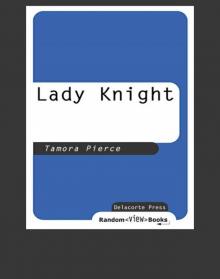 Lady Knight
Lady Knight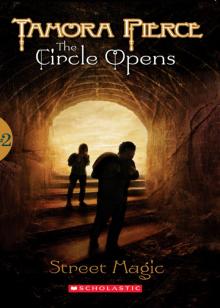 Street Magic
Street Magic Bloodhound
Bloodhound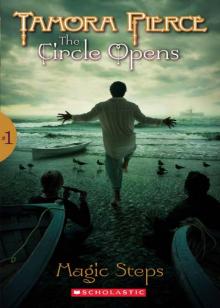 Magic Steps
Magic Steps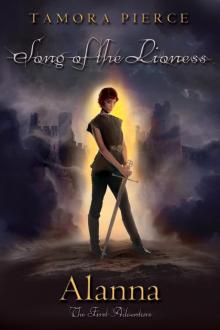 Alanna: The First Adventure
Alanna: The First Adventure Emperor Mage
Emperor Mage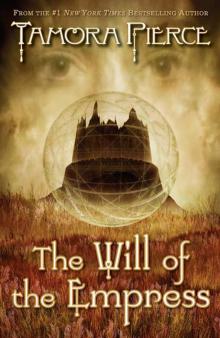 The Will of the Empress
The Will of the Empress The Realms of the Gods
The Realms of the Gods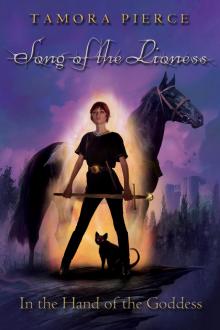 In the Hand of the Goddess
In the Hand of the Goddess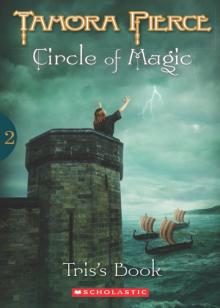 Tris's Book
Tris's Book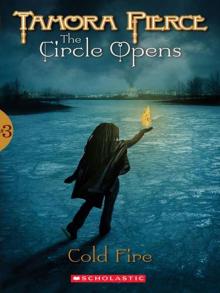 Cold Fire
Cold Fire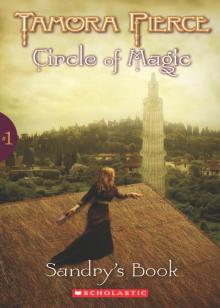 Sandry's Book
Sandry's Book Wild Magic
Wild Magic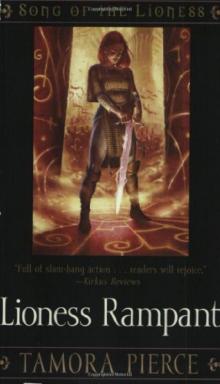 Lioness Rampant
Lioness Rampant The Woman Who Rides Like a Man
The Woman Who Rides Like a Man First Test
First Test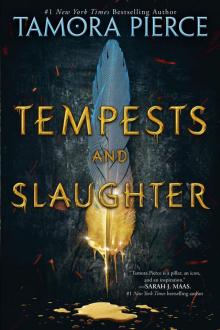 Tempests and Slaughter
Tempests and Slaughter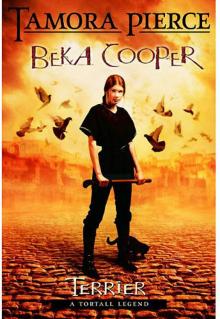 Terrier
Terrier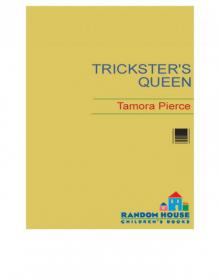 Trickster's Queen
Trickster's Queen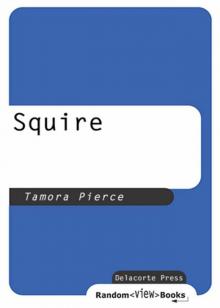 Squire
Squire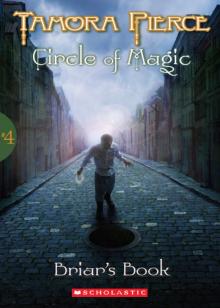 Briar's Book
Briar's Book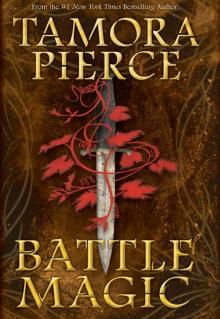 Battle Magic
Battle Magic Page
Page Melting Stones
Melting Stones Wolf-Speaker
Wolf-Speaker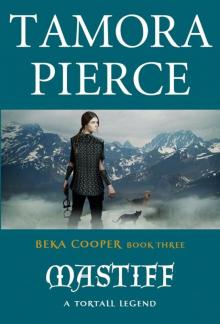 Mastiff
Mastiff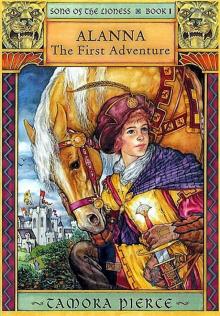 The Song Of The Lioness Quartet #1 - Alanna - The First Adventure
The Song Of The Lioness Quartet #1 - Alanna - The First Adventure The Circle Opens #2: Street Magic: Street Magic - Reissue
The Circle Opens #2: Street Magic: Street Magic - Reissue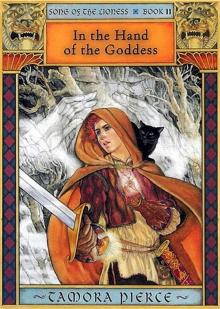 Tortall 1 - Song Of The Lioness #2 - In The Hand of the Goddess
Tortall 1 - Song Of The Lioness #2 - In The Hand of the Goddess Protector of the Small Quartet
Protector of the Small Quartet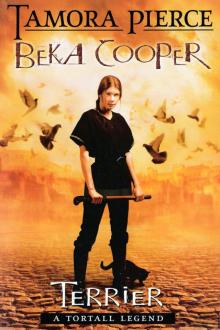 Beka Cooper 1 - Terrier
Beka Cooper 1 - Terrier Alanna
Alanna Trickster's Choice
Trickster's Choice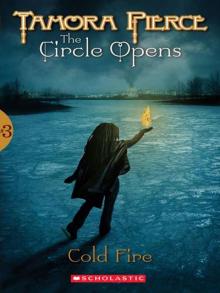 Circle Opens #03: Cold Fire
Circle Opens #03: Cold Fire In the Hand of the Goddess (The Song of the Lioness)
In the Hand of the Goddess (The Song of the Lioness)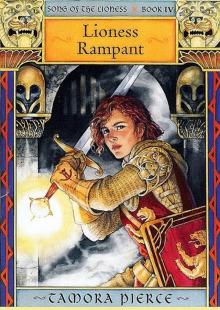 Song of the Lioness #4 - Lioness Rampant
Song of the Lioness #4 - Lioness Rampant Young Warriors
Young Warriors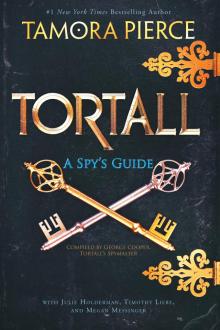 Tortall
Tortall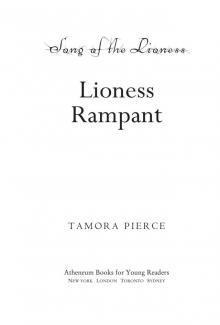 Lioness Rampant (Song of the Lioness)
Lioness Rampant (Song of the Lioness) Melting Stones (Circle Reforged)
Melting Stones (Circle Reforged) The Circle Opens #4: Shatterglass
The Circle Opens #4: Shatterglass